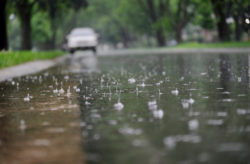Tips for Driving on Slick Roads in Fort Walton Beach

According to the Weather Atlas, Florida has a climate that ranges from humid subtropical in its north and central parts to tropical in the south. Known as the “Sunshine State,” Florida is the warmest of all American states, with an average daily temperature of 70.7°F (21.5°C) and 2,800 hours of sunlight over the year. Average high temperatures in July are in the 90s, while average low temperatures in January are in the 40s range in the northern part and the 60s in the state’s southern region.
The ocean acts as a temperature regulator due to which high temperatures rarely touch 100°F (37.8°C), and low temperatures seldom go below freezing in the north and rarely in south Florida. Snowfall is rare in the south and meager in the north during winter, but frost is common, while fog is consistent across the state.
The wet season lasts from May to well into the fall months, as Florida records the highest rainfall of all American states. These driving conditions are exacerbated by the fact that Fort Walton Beach sits directly on the shoreline.
All of this, along with the fact that superhighways criss-cross the state for miles and miles, makes Florida one of the slipperiest states in the country for driving. If you have been involved in an auto accident along Florida’s slick roadways, contact a Fort Walton Beach slick roads car accident attorney at Searcy Denney for help.
Tips for Driving on Slick Roads
If you can see approaching whiteout-type rain, your best bet is to find a safe place to park, such as off an exit or in a parking lot, and wait it out. Nonetheless, be aware that parking alongside the highway is just as dangerous as driving because approaching cars will not see you until the last minute. Due to the inclement weather, they will not likely be able to stop in time to avoid hitting you. If you have to, try to find an overpass to park under and park as far from the road as possible.
If you find yourself unavoidably driving on slick roads, keep these tips in mind:
- Drive with low beams or fog lights. This helps reduce the reflection of light bouncing off water particles.
- Avoid changing lanes or passing other vehicles. If a vehicle is trying to pass you, slow down to let them get as far out in front of you as you can.
- Keep your windshield and mirrors clear.
- Avoid in-car distractions. Let the kids fight it out themselves quietly.
- Keep swiveling your head left-right-left to be constantly aware of what’s going on around you.
- Use your signals earlier than usual. Let drivers know what moves you are making earlier than usual so they can adjust.
- Keep a safe distance behind other vehicles. You’ll need more space to stop on icy roads if something ahead of you were to happen; therefore, you want to make sure you are a safe enough distance behind other cars to ensure you don’t get into an accident if the person in front of you slams on the brakes.
- Above all: slow down! Reduced visibility with slippery road conditions is a dangerous combination. Simply accept that your trip will take longer than usual.
Contact a Fort Walton Beach Slick Roads Car Accident Attorney for Help With Your Claim
Driving on slick roads is unavoidable in Florida. If you have sustained injuries due to an accident, contact a Fort Walton Beach slick roads car accident attorney at Searcy Denney. We offer a free consultation and work on a contingency fee basis, which means you don’t pay a penny until you recover. If you need our help, contact us online today.
Share This


